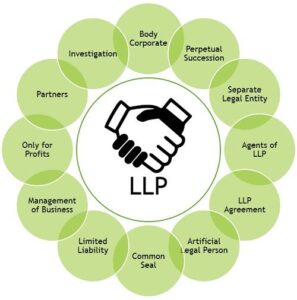
User Intent
Users searching for “LLP with corporate members” want to understand whether a Limited Liability Partnership (LLP) can have corporate entities as its partners. They seek clarity on the legal structure, benefits, limitations, and comparisons with other business forms.
Introduction
A Limited Liability Partnership (LLP) is a popular business structure that combines the flexibility of a partnership with the limited liability protection of a company. Many businesses wonder whether an LLP can have corporate entities (such as private limited companies or LLPs) as its partners. The answer is yes, but certain legal and regulatory aspects must be considered.
In this article, we will explore the definition, applications, benefits, limitations, and comparisons of an LLP with corporate members.
Definition of LLP with Corporate Members
An LLP with corporate members is an LLP where one or more of its partners is a corporate entity rather than an individual. In many jurisdictions, companies, LLPs, and foreign entities can be designated as members of an LLP, provided they comply with statutory regulations.
According to LLP Acts in different countries, a corporate member enjoys the same rights and responsibilities as an individual partner. However, additional compliance requirements, such as disclosure norms and financial reporting, may apply.
To visit: https://www.mca.gov.in
Application of LLP with Corporate Members
LLPs with corporate members are widely used in various industries for specific purposes, including:
- Joint Ventures – Companies often collaborate through an LLP structure to share risks and benefits without merging operations.
- Investment Vehicles – Private equity firms and venture capitalists use LLPs with corporate members for fund pooling.
- Professional Services – Accounting firms, law firms, and consultancies may have LLPs with corporate entities as partners.
- Subsidiary & Holding Companies – Businesses set up LLPs with corporate members for better tax efficiency and liability segregation.
- International Operations – Foreign companies use LLPs with corporate members to enter new markets with limited liability exposure.
Benefits of LLP with Corporate Members
1. Limited Liability Protection
Corporate members in an LLP enjoy limited liability, meaning their financial exposure is restricted to their investment in the LLP.
2. Separate Legal Identity
An LLP has a distinct legal identity, enabling corporate partners to conduct business transactions, enter contracts, and hold assets.
3. Tax Efficiency
LLPs with corporate members often benefit from pass-through taxation, avoiding double taxation on profits.
4. Operational Flexibility
Unlike corporations, LLPs provide less regulatory burden, giving corporate members flexibility in decision-making and profit distribution.
5. Continuity & Perpetual Succession
Since an LLP has a separate legal existence, it continues to exist even if one or more corporate partners exit.
6. Ideal for Business Collaborations
Large businesses prefer LLPs for joint ventures, as they allow multiple corporate entities to pool resources without the complexities of a traditional company structure.
Limitations of LLP with Corporate Members
1. Compliance Burden
An LLP with corporate members must comply with additional regulatory requirements, including audits and financial disclosures.
2. Restricted Fundraising Options
Unlike private limited companies, LLPs cannot raise funds from the public or issue shares.
3. Limited Recognition in Some Countries
Not all jurisdictions support LLPs with corporate members, making international expansion complicated.
4. Complex Decision-Making
Multiple corporate members may lead to delays in decision-making, requiring well-drafted agreements to avoid conflicts.
5. Taxation Complexities
While LLPs often enjoy tax benefits, some jurisdictions impose additional levies on LLPs with corporate members.
Comparative Table: LLP with Corporate Members vs. Other Business Structures
| Feature | LLP with Corporate Members | Private Limited Company | General Partnership |
|---|---|---|---|
| Legal Identity | Separate from partners | Separate from shareholders | No separate identity |
| Liability | Limited to investment | Limited to shares held | Unlimited |
| Taxation | Pass-through (varies) | Corporate tax | Individual tax |
| Compliance | Moderate | High | Low |
| Fundraising | Restricted | Can issue shares | Limited |
| Governance | Flexible | Strict under company law | Very flexible |
| Perpetual Succession | Yes | Yes | No |
Conclusion
An LLP with corporate members is an excellent business structure for joint ventures, investment vehicles, and professional services. It offers limited liability protection, operational flexibility, and tax efficiency while requiring moderate regulatory compliance. However, it may not be ideal for businesses seeking public fundraising or operating in jurisdictions with limited LLP recognition.
If your business involves multiple corporate stakeholders, an LLP with corporate members can be a strategic choice for better collaboration and risk management.
Frequently Asked Questions (FAQs)
1. Can a private limited company be a partner in an LLP?
Yes, a private limited company can become a partner in an LLP, provided its Articles of Association permit it.
2. How many corporate members can an LLP have?
Most jurisdictions allow multiple corporate members in an LLP, but at least one designated partner must be an individual.
3. Is an LLP with corporate members taxed differently?
Taxation varies by country. Some jurisdictions offer pass-through taxation, while others impose additional levies.
4. Can an LLP with corporate members raise funds from the public?
No, LLPs cannot issue shares or raise funds from the public like companies.
5. What are the reporting requirements for an LLP with corporate members?
LLPs with corporate members must file annual financial statements and compliance reports with regulatory authorities.

